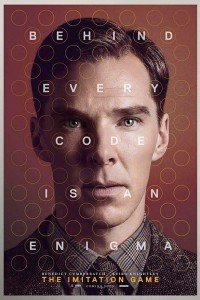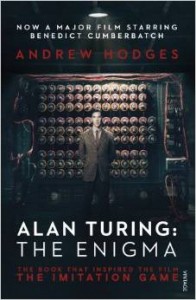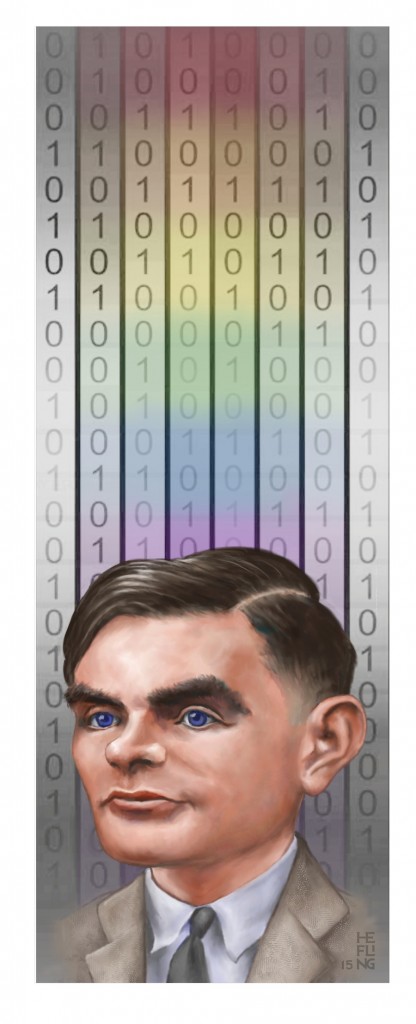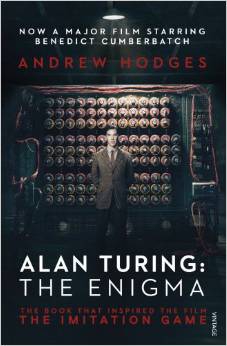 The Imitation Game
The Imitation Game
Directed by Morten Tyldum
Black Bear Pictures
 Alan Turing: The Enigma
Alan Turing: The Enigma
by Andrew Hodges
Princeton. 768 pages, $16.95
“BASED ON A TRUE STORY” are probably the most ominous words in film, but that’s what flashes across the screen at the opening of The Imitation Game, the new biopic about the British mathematician Alan Turing. Like Breaking the Code, the play and the film starring Derek Jacobi that came out in 1986 and 1996, respectively, The Imitation Game is based on the massive biography of Turing by gay activist and Oxford mathematician Andrew Hodges, which was published in 1983 (and was followed, in 2006, by a much shorter life by David Leavitt).
Although 768 pages long, Hodges’ Alan Turing: The Enigma is extremely readable. The first chapter alone is a vivid portrait of an English childhood in the early part of the 20th century. Turing’s father was a civil servant in India; Alan and his older brother were farmed out to couples in England who took in children till they went away to boarding school. His mother chose Sherborne School in Dorset, being aware that her son’s brilliance and eccentricity made the choice of the right school crucial. At Sherborne, however, he was not merely taunted by his classmates but buried alive under the floorboards of his dormitory in a scene even more horrifying in the movie than in the book. But Turing ended up a great success at school and went on to become a lecturer in mathematics at Cambridge—at the same time that another famous gay mathematician, Ludwig Wittgenstein, was teaching there. Then, at the start of World War II, Turing was recruited by the British government to crack the code the Nazis were using to communicate with the U-boats that were causing havoc on British shipping. And this is the heart of the film: the efforts of a group of mathematicians, working in a big Victorian mansion north of London called Bletchley Park, to crack the Nazis’ Enigma code.
The movie cuts back and forth between Turing’s school years, when he fell in love with a classmate named Christopher Morcum, and his work at Bletchley Park, and his subsequent arrest for gross indecency (i.e., homosexual acts) after the War. The movie’s mantra,  repeated at key moments, like something from Star Wars, is: “Sometimes it is the people whom no one imagines anything of who do the things that no one can imagine.” When Turing’s M16 handler tells him, “You’re exactly the person I hoped you would become,” it’s thrilling: a boy has grown up, a nerd has learned to be a team player, a nebbish has delivered the goods.
repeated at key moments, like something from Star Wars, is: “Sometimes it is the people whom no one imagines anything of who do the things that no one can imagine.” When Turing’s M16 handler tells him, “You’re exactly the person I hoped you would become,” it’s thrilling: a boy has grown up, a nerd has learned to be a team player, a nebbish has delivered the goods.
It’s no surprise that Benedict Cumberbatch plays Turing as a geek; though how much of a geek Turing was is hard to tell from the book. He did not dress carefully; but where on the spectrum of eccentricity does a man lie who used a piece of string or an old tie instead of a belt to hold his pants up? He looks very handsome in some photos; he was shy, reserved, with a high-pitched voice and an occasional stammer. He decided early on whether you were smart enough to be listened to, he would walk out of parties he thought a waste of time, and he did not believe in small talk. He was also such a serious runner that he would have tried out for the Olympics had he not injured his hip. He loved to hike, and to sunbathe nude; he had many friends, delivered papers, taught mathematics, went to conferences, examined doctoral candidates, and was the main liaison with American scientists at Bell Labs and the U.S. government during the War.
In short, he was a success, a prominent scientist whose peers and superiors kept supporting his work, famous among mathematicians at an early age for his paper on computable numbers. He despised pretension of any kind, whether intellectual or social. He seems to have been, on some level, the eternal English schoolboy, and a creature, Hodges implies, of the coddled, immensely tolerant, and rarefied atmosphere created by the higher reaches of British education—the King’s College, Cambridge, of economist John Maynard Keynes, novelist E. M. Forster, and philosopher Ludwig Wittgenstein.
Like Wittgenstein, whose course he took and whose conversation with the Austrian philosopher we have a record of, Turing “liked ordinary things,” Hodges writes. “But he found himself to be an ordinary English homosexual atheist mathematician. It would not be easy.” Ironically, the word used by a friend who saw The Imitation Game with me to describe the movie was “ordinary.” It’s what the British do well—a good Masterpiece Theater period piece—good script, well acted, intelligent. But even the shots of the Blitz—the beautiful silvery compositions of wet streets, glistening rubble, gray sky—look like ones we’ve seen many times before. Halfway through, I started thinking of Chariots of Fire and Downton Abbey for some reason. This movie, in fact, had an American producer, an American screenwriter, and a Scandinavian director; yet the story, setting, and cast are so British that it comes off as a product of the same culture that released a film about Stephen Hawking at about the same time, which makes one think that what differentiates Britons from Americans is that the former romanticize their artists and intellectuals in a way that we do not. (Walt Whitman in Love? I don’t think so.)
But Turing is a significant figure not just in British but in gay history—a gay martyr, if ever there was one: a heroic mathematician who helped save his country from the Nazis and was then prosecuted by that same country for having sex with another man. His story also fits some of Hollywood’s favorite tropes: the individual versus authority, the doomed loner, the romantic genius.
Depicting genius on film has always been a problem for biopics, whether on Cole Porter or Jackson Pollock. How do you portray the creative struggle on celluloid? In this case, you have people throw papers. Papers are tossed throughout The Imitation Game—by Turing, clearing his desk with one dramatic swoop; by his nemesis, the military authorities, emptying drawers; by the code-breakers at the end, burning them in a pile to cover all traces of their work. Just count the scenes in which throwing papers provides the only means of expressing the travails of intellectuals.
Because mental activity is invisible, the most dramatic moments in this movie are all made up, so far as I can tell, by the screenwriter, who had the task of translating a life of the mind into drama. So be it. But the movie verges on the melodramatic in so many ways. Indeed, the point of the central drama seems to be “How a Geek Learned to Work With Others and Become a Team Player.” At one point it’s Joan Clarke, the only woman on the team, who tells Turing that if he wants his colleagues to work for him they will first have to like him. Big news for the Geek! It’s Joan (played by Keira Knightley) who leads Benedict Cumberbatch’s Turing into the land of regular folk. He even asks her to marry him. Yes, the woman Knightley plays really existed, and Turing was engaged to her, until he broke it off. In Hodges this does not loom large. In the film, however, Knightley takes up so much space that one may ask, Why is her part so prominent? It’s because she is the bridge, the stand-in for the heterosexual audience, which is, let’s face it, a lot bigger than the gay one.
The homosexual theme is hardly shied away from; when Turing tells Clarke why he cannot marry her, and she says the fact that he’s gay makes no difference, her response is as wonderfully unconventional and defiant of common pieties as Turing was himself. But her time on-screen may be why the attempt to break the Enigma code plays much like one of those old Judy Garland–Andy Rooney movies in which the kids get together to put on a musical in the barn.
In reality, the work at Bletchley was a long collaboration among many brilliant mathematicians who themselves were building on the work of previous mathematicians, all of which is gone into at considerable, and frankly stupefying length, in the Hodges biography, and none of which has a visual equivalent that the movie could use. But a movie requires the classic “Eureka!” moment, dear to audiences since the days of the Greeks, which in this case occurs in a pub. And when we need to dramatize the conflict between solitary genius and ignorant authority, a scene that goes back to the Roman soldier who killed Archimedes, the military men storm the hut in which Turing’s machine is turning, just like the peasants assaulting the castle in Young Frankenstein. Compared to print, the vocabulary of biopics is limited.
That may be why we learn that Turing killed himself only by reading a postscript at the end of the movie. No one, not even Hodges, knows why he did this. We can only speculate. Several bad things had happened to him, chief among them that when he moved to Manchester after the War, he started cruising and picked up a young man whose friend broke into Turing’s house and stole some things. When Turing reported this to the police, he revealed, with his usual contempt for obfuscation, exactly what his relationship with the thief’s friend was, at which point he was arrested for gross indecency—the charge that had destroyed Oscar Wilde a few generations earlier. (“Feasting with panthers” was the phrase Wilde used for consorting with riff-raff, and it seems apt here: the thief went off to jail, but Arnold Murray, the trick, moved to London, went to work in a Lyon’s, learned to play guitar, and ended up in a band—although, when Hodges interviewed him, he learned that Murray, who lived till 1989, still felt guilty over his part in Turing’s demise.) Then, when given a choice between prison and a form of chemical castration via the ingestion of female hormones, which was thought at the time to mitigate homosexual desire, Turing chose the latter. As stoic as Turing was, it was all public; and since “for him, as for most people,” Hodges writes, “the family was the last bastion of deceit,” he still had to tell his mother he was homosexual—and tell friends who already knew this fact that he’d been arrested.
But it wasn’t quite the gay martyrdom people imagine. Turing’s neighbors were a family who continued to include him in their lives; he was going to a psychiatrist whose family also cherished him; the press was not excessive, the way it would be today; he had stopped taking the hormones for almost a year; and his work showed no signs of decline, according to a friend. Nevertheless, in 1954, at the age of 41, Turing committed suicide by eating an apple that contained cyanide.
“Dip the apple in the brew, let the sleeping death seep through,” are lines from Disney’s Snow White and the Seven Dwarfs that Turing liked to repeat after seeing the movie in 1938. But why act them out sixteen years later, and in a way that one has to call particularly camp? Shame over what had happened to him, the hormone treatment (which caused depression), a loss of inspiration (mathematics, it’s said, is a young man’s game), disgust with society’s disapproval of a sexual orientation that he found entirely natural? The movie implies that it was atavistic grief over the loss of his first love, Christopher Morcum, who died shortly after graduation from Sherborne. In one of the final scenes, a teary Cumberbatch addresses the machine he’s built in his house as “Christopher.” Was that it? Who knows? Suicide can be the biggest enigma of all.
Hodges, a gay activist, devotes his last chapter to putting Turing’s death in the context of its homophobic times. He even floats the idea that after the War, when the American government deemed homosexuals to be security risks (because they were considered emotionally unstable and subject to blackmail), Turing was seen as a liability by the security agencies for whom he had once worked. Hodges further suggests that a trip to Norway on which Turing met a young man—though nothing more than a kiss was exchanged, Turing wrote a friend—who later tried to visit Turing in England, and was sent home packing, brought home to British Intelligence the fact that the secrets to which Turing had been exposed might be shared with foreigners in gay bars. What to do? As King George V allegedly said, “I thought that men like that shot themselves.” There is no hard evidence for murder, but there’s no disputing the wretched view of homosexuality held at the time by government and society.
Indeed, one could hardly devise a morality play more stark than this one—a man who saw no shame in being homosexual is arrested by the country he helped save and chemically castrated for having sex with another man. But one will never know what he was feeling when he bit into the deadly apple. Feelings were apparently the problem; even the two longish sexual relationships he had, Hodges says, inspired no great lust or love in him—though he did have an eye for beauty. “Who is that beautiful boy?” he asked once in a loud voice at work. But Turing was no Edward Carpenter, the handsome gay socialist who inspired E. M. Forster’s Maurice, a man who, like Turing, was not only a mathematician but believed in the beauty of men and mountains, in Nature and human friendship. Carpenter found himself a lover and lived happily ever after with him in a cottage; Turing was less successful in that regard. It is all, of course, immeasurably sad, even if the movie only announces his death at the end in a postscript on the screen—like AIDS statistics in films about the plague—along with the statement that the machines Turing worked on are “what we now call computers.”
Were a movie to be made that really portrayed Turing’s life, it would be about a young man who fell in love with a classmate at his public school, lost him at a young age to bovine tuberculosis, and never found love again, who was rebuffed by the straight friends he proposed sex to, who endured loneliness and isolation, and, when he finally entered the gritty world of homosexual cruising, got arrested for gross indecency and committed suicide. But that’s another story: much more homosexual. What mainstream film makers do with homosexuality is up to them. Foxcatcher, a deeply creepy movie, is also “based on a true story,” and while it never even mentions homosexuality, it implies that the villain was a murderous closet queen, when in reality the wrestler whose brother John du Pont murdered says he was not gay at all. In The Imitation Game, on the other hand, the homosexual aspect is clearly admitted, though the attempt at the end to wring emotion from Turing’s love for Christopher Morcum simply fizzles.
What’s left is a story of the Blitz. In real life Turing was always moving on—from pure mathematics to proto-computers to the morphology of plants—but this is yet another film about the way England defeated Hitler. At least, however, the heterosexual audience will learn what this gay geek of a genius did to save his country, and how he suffered. Until now we’ve had only Oscar Wilde, though English homophobia goes back to the legend of Edward the Second, whose love for his knight Gaveston led his barons to execute their monarch by shoving a red-hot poker up his ass.
Andrew Holleran’s novels include Dancer from the Dance, The Beauty of Men, and Grief.







Discussion2 Comments
Mathematicians always seem obsessed with unlocking the secret keys to the universe. It maybe Turing discovered that in his time even effectually in his own life he was supposed to be a hero, but he wasn’t supposed to be gay. Of course sexual preference and orientation should be a redeeming character portait of any genius. Yet in Turings discovery of the computer. It maybe his homosexuality was like a double edged sword teeming with mystery and doubt. I feel Turing was a great mind. Yet see his shortcoming as a mathematician who is atheist. In that in this notion it can be presumed that he viewed everything withing his world as the way it was supposed to be, and yet to his own rather trite shortcomings one example of homophobia seemed to have him call to question everything about himself that was human. Having saved the world he was no longer allowed to live in it himself, and be the person who he was intended to be.
I actually wanted to write down a simple comment so as to appreciate you for those awesome secrets you are showing on this site. My considerable internet search has finally been recognized with good content to write about with my relatives. I ‘d believe that most of us readers are unquestionably endowed to exist in a remarkable community with so many wonderful individuals with good hints. I feel quite blessed to have encountered the web pages and look forward to many more enjoyable moments reading here. Thank you once more for all the details.